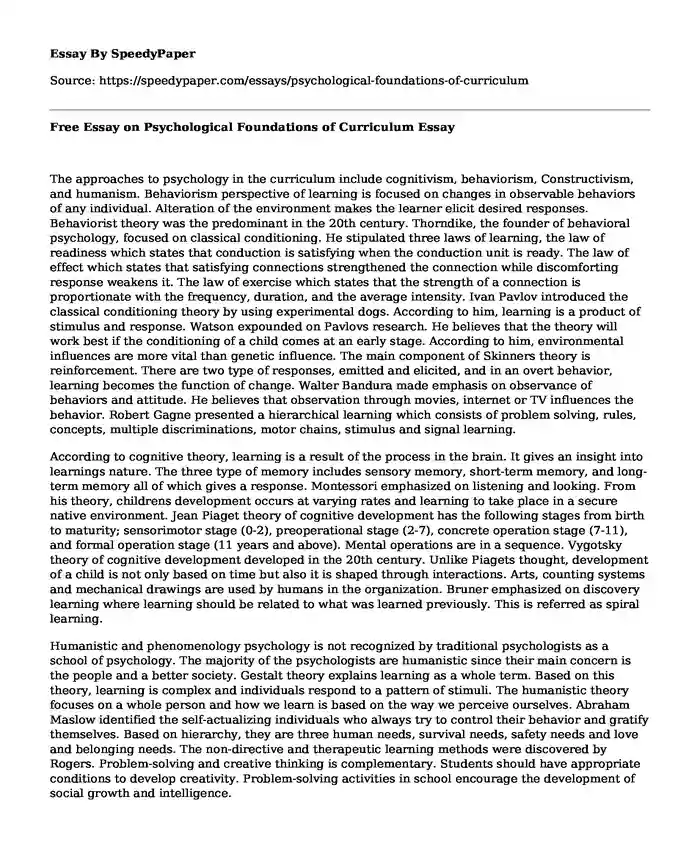
| Type of paper: | Essay |
| Categories: | Psychology |
| Pages: | 3 |
| Wordcount: | 557 words |
The approaches to psychology in the curriculum include cognitivism, behaviorism, Constructivism, and humanism. Behaviorism perspective of learning is focused on changes in observable behaviors of any individual. Alteration of the environment makes the learner elicit desired responses. Behaviorist theory was the predominant in the 20th century. Thorndike, the founder of behavioral psychology, focused on classical conditioning. He stipulated three laws of learning, the law of readiness which states that conduction is satisfying when the conduction unit is ready. The law of effect which states that satisfying connections strengthened the connection while discomforting response weakens it. The law of exercise which states that the strength of a connection is proportionate with the frequency, duration, and the average intensity. Ivan Pavlov introduced the classical conditioning theory by using experimental dogs. According to him, learning is a product of stimulus and response. Watson expounded on Pavlovs research. He believes that the theory will work best if the conditioning of a child comes at an early stage. According to him, environmental influences are more vital than genetic influence. The main component of Skinners theory is reinforcement. There are two type of responses, emitted and elicited, and in an overt behavior, learning becomes the function of change. Walter Bandura made emphasis on observance of behaviors and attitude. He believes that observation through movies, internet or TV influences the behavior. Robert Gagne presented a hierarchical learning which consists of problem solving, rules, concepts, multiple discriminations, motor chains, stimulus and signal learning.
According to cognitive theory, learning is a result of the process in the brain. It gives an insight into learnings nature. The three type of memory includes sensory memory, short-term memory, and long-term memory all of which gives a response. Montessori emphasized on listening and looking. From his theory, childrens development occurs at varying rates and learning to take place in a secure native environment. Jean Piaget theory of cognitive development has the following stages from birth to maturity; sensorimotor stage (0-2), preoperational stage (2-7), concrete operation stage (7-11), and formal operation stage (11 years and above). Mental operations are in a sequence. Vygotsky theory of cognitive development developed in the 20th century. Unlike Piagets thought, development of a child is not only based on time but also it is shaped through interactions. Arts, counting systems and mechanical drawings are used by humans in the organization. Bruner emphasized on discovery learning where learning should be related to what was learned previously. This is referred as spiral learning.
Humanistic and phenomenology psychology is not recognized by traditional psychologists as a school of psychology. The majority of the psychologists are humanistic since their main concern is the people and a better society. Gestalt theory explains learning as a whole term. Based on this theory, learning is complex and individuals respond to a pattern of stimuli. The humanistic theory focuses on a whole person and how we learn is based on the way we perceive ourselves. Abraham Maslow identified the self-actualizing individuals who always try to control their behavior and gratify themselves. Based on hierarchy, they are three human needs, survival needs, safety needs and love and belonging needs. The non-directive and therapeutic learning methods were discovered by Rogers. Problem-solving and creative thinking is complementary. Students should have appropriate conditions to develop creativity. Problem-solving activities in school encourage the development of social growth and intelligence.
Cite this page
Free Essay on Psychological Foundations of Curriculum. (2019, Nov 18). Retrieved from https://speedypaper.com/essays/psychological-foundations-of-curriculum
Request Removal
If you are the original author of this essay and no longer wish to have it published on the SpeedyPaper website, please click below to request its removal:
- Leonardo da Vinci
- Analysis of Salvation by Langston Hughes - Essay Example
- Starbucks Collaboration - Business Essay Example
- Free Paper Sample: The Influence of FIFA 2018 on the Quality of Service Offered in Russia
- College Debt in the U.S. - Free Essay Example
- Paper Example on the Rules of the Law
- Essay Sample on Improving Personal and Organizational Communication
Popular categories




